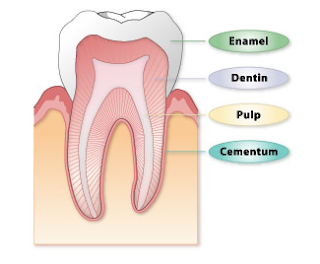Toothache
A toothache or tooth pain is most
often caused when the nerve to a tooth is irritated. Risk factors for a toothache include dental infection, gum
disease, plaque, dental decay, injury, cracked teeth, poorly placed fillings or
crowns, failing or leaking fillings or crowns, loss of a tooth (including tooth
extractions), etc. There are instances, however, where pain originating from
outside the mouth radiates to the mouth, thus giving the impression that the
pain is of tooth origin. Occasionally, heart problems can give a sensation of
tooth pain. Pregnancy can also be a risk for tooth problems that lead to pain.
What Causes a Toothache?
Toothaches occur from inflammation of
the central portion of the tooth called pulp. The pulp contains nerve endings
that are very sensitive to pain. Inflammation to
the pulp, or pulpitis, can be caused by anything that has contact with the
tooth. Common causes of tooth pain are the following:
- · Dental cavities/tooth decay
- · Abscessed tooth
- · Teeth grinding or clenching
- · Damaged or broken fillings or crowns
- · Orthodontic movement – braces
- · Impacted wisdom tooth
- · Tooth fracture
- · Gingivitis
- · Gum recession
- · Gingivitis
- · Cold sore or canker sore
Signs and Symptoms
ofa Toothache
Toothache
and jaw pain are common complaints.The signs and symptoms that might lead one
to seek care include the following:
- · Tooth pain that may be sharp, throbbing, or constant.
- · Swelling around a tooth or swelling of the jaw or cheek
- · Pain with chewing
- · Bleeding or discharge from around a tooth or gums
- · Fever or headache
- · Sensitivity to hot or cold air and liquids
- · Injury or trauma to the area
When should one see a
Dentist about a Toothache?
Proper identification and treatment of
dental infections is important to prevent
its spread to other parts of the face and skull and possibly even to the
bloodstream.See your dentist as soon as possible about your toothache if:
- · You have a toothache that lasts longer than 1 or 2 days
- · Your toothache is severe
- · You have a fever, earache, or pain upon opening your mouth wide
- · Dental pain is not relieved by over-the-counter medications.
What happens when one
visits the Dentist for a Toothache?
To treat your toothache, the dentist
will first obtain your medical history and conduct a physical exam. He or she
will ask you questions about the pain, such as when the pain started, how
severe it is, where the pain is located, what makes the pain worse, and what
makes it better. The dentist will examine your mouth, teeth, gums, jaws,
tongue, throat, sinuses, ears, nose, and neck. X-rays may be taken as well as
other tests, depending on what the dentist suspects is causing your toothache.
What
Treatments are available for a Toothache?
Treatment for a toothache depends on
the cause. If a cavity is causing the toothache, the dentist will fill the
cavity or possibly extract the tooth, if necessary. A root canal might be
needed if the cause of the toothache is
determined to be an infection of the tooth's nerve. Bacteria that have worked
their way into the inner aspects of the tooth cause such an infection. An
antibiotic may be prescribed if there is fever or swelling of the jaw.
How Can Toothaches Be
Prevented?
Since most toothaches are the result
of tooth decay, following good oral hygiene practices can prevent toothaches.
Good oral hygiene practices consist of brushing regularly with a
fluoride-containing toothpaste, flossing once daily, rinsing once or twice a
day with an antiseptic mouthwash, and seeing the dentist twice a year for
professional cleaning. In addition to these practices, eat foods low in sugar
and ask the dentist about sealants and fluoride applications.



Comments
Post a Comment